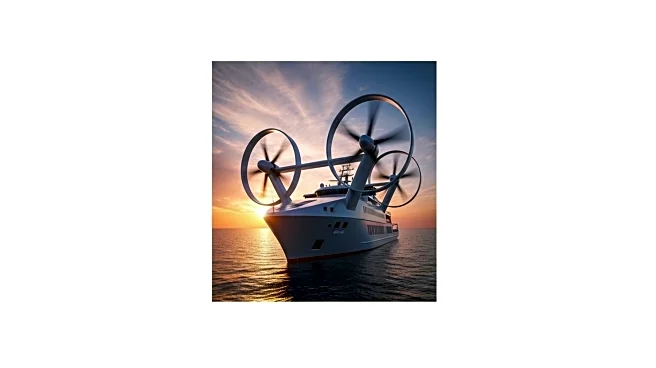What is the story about?
What's Happening?
The century-old Flettner rotor technology, initially demonstrated in 1925, is experiencing a resurgence in the maritime industry. Originally designed by German inventor Anton Flettner, these rotors harness the Magnus effect to improve fuel efficiency by redirecting wind to generate forward thrust. Despite its initial failure due to the low cost of fossil fuels and the Great Depression, modern-day decarbonization targets have renewed interest in this technology. Currently, at least 35 commercial freight ships are equipped with Flettner rotors, which can reduce fuel bills by up to 20% and decrease greenhouse gas emissions. The rotors are now made with lighter composite materials, such as carbon fiber, enhancing their efficiency compared to the original designs.
Why It's Important?
The revival of Flettner rotor technology is significant in the context of global efforts to reduce carbon emissions and improve fuel efficiency in the maritime sector. As shipping companies face increasing pressure to meet decarbonization targets, technologies like Flettner rotors offer a sustainable solution to reduce reliance on fossil fuels. This shift not only contributes to environmental conservation but also presents economic benefits by lowering operational costs. The adoption of such technologies could set a precedent for innovation in other sectors seeking to balance economic and environmental priorities.
What's Next?
The continued adoption of Flettner rotors in the maritime industry may lead to further technological advancements and increased investment in sustainable shipping solutions. As more companies recognize the economic and environmental benefits, the demand for such technologies is likely to grow. This could prompt further research and development, potentially leading to new designs and applications beyond the current scope. Stakeholders, including shipping companies and environmental groups, may advocate for policy changes to support the integration of sustainable technologies in maritime operations.
Beyond the Headlines
The resurgence of Flettner rotor technology highlights the broader trend of revisiting historical innovations to address contemporary challenges. This approach underscores the importance of adaptability and innovation in achieving sustainability goals. The successful integration of such technologies could inspire other industries to explore similar strategies, fostering a culture of innovation and environmental responsibility.















